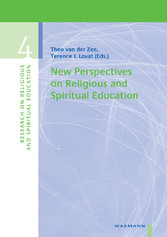Suchen und Finden
Service
Contents
6
Meeting the needs for new perspectives of thought and practice in religious and spiritual education
8
An interdisciplinary approach
9
A balance between explanation and interpretation
10
Relation with other fields of interest
11
References
12
I. An interdisciplinary approach
14
Does body-based learning lead to a better retention of religious education knowledge?
16
Abstract
16
Introduction
16
1. Body-based learning in religious education
17
2. Research question, methodology and sample
21
3. Empirical results
24
4. Discussion
29
References
32
Developing students’ willingness to encounter difference
40
Teachers’ practices in Islamic education Abstract
40
Introduction
40
1. Different approaches to dealing with diversity in religious education
42
2. Empirical research into teachers’ practices in Islamic education
44
3. Results
45
4. Discussion
53
5. Conclusion
54
References
55
Thinking about the afterlife
58
A cognitive science perspective on what children tend to believe Abstract
58
Introduction
58
1. Theoretical reflection
60
2. Empirical research
62
3. Method
62
4. Results
64
5. Conclusion and discussion
67
References
69
Abstract
72
Introduction
72
1. Theoretical perspectives
73
2. The Norwegian context
76
3. The texts and tasks
77
4. Three texts about Jesus
79
5. Conclusion and concluding remarks
83
References
85
Interfaith education and phenomenological method
88
Abstract
88
Introduction
88
1. Foundational epistemological and methodological thought
89
2. Dewey, Habermas and phenomenology
91
3. The origins and distinctiveness of phenomenology
93
4. The complementary ends of phenomenology
94
5. Phenomenology and the spiritual exemplar
96
6. Phenomenology as method for interfaith education
98
7. Conclusion
99
Abstract
102
Introduction
102
1. Theoretical background
103
2. Empirical research into morality, religion and spirituality in educators’ voices
104
3. Results
107
4. Conclusion
111
References
112
II. A balance between explanation and interpretation
116
‘Ears to hear’ – the Bible, the Sower and performative Christianity
118
Abstract
118
Introduction and research questions
118
1. Parts and wholes in and out of context
119
3. Localising the global: The Sower in Solentiname
125
4. Re-distributing the local: The sower in the classroom
129
5. Conclusion
131
References
132
Personal projects among students of theology
134
Motivational variations between different study phases
134
Introduction
134
1. Theoretical background: The personal worldview as a dynamic context for goals and intentions
136
2. Empirical research
138
3. Results
139
4. Discussion
144
5. Conclusion
146
References
146
Religious myth as the leading discourse in religious education
150
A reflection based on the Abrahamic religions Abstract
150
Introduction
150
1. Culture and multiculturalism
151
2. Religion and religious pluralism
152
3. The pivotal role of myth
154
4. The Jewish myth
155
5. The Christian myth
157
6. The Islamic myth
160
7. Implications for religious education
161
8. Further research
163
9. Conclusion
164
References
164
Imagination’s role in religious and spiritual education
166
Abstract
166
Introduction
166
1. “Corporate images” and the Christian world of meaning
167
2. Imagination: Operating processes
172
3. Imagination: Implications for religious and spiritual education
176
4. Conclusion
177
References
177
Rethinking the role of religious education in a knowledge society
180
A Shia Ismaili Muslim perspective Abstract
180
Introduction
180
1. Relevant literature background
183
2. An interdisciplinary approach to religious education
185
3. A cosmopolitan ethic through religious education
189
4. Conclusion
192
References
193
Internet Sources
195
III. A contribution to wider fields of interest
196
Education and nurture revisited in the light of spirituality
198
Abstract
198
Introduction
198
1. The dynamics of spirituality in education
200
2. How can religion and religious education relate to education in general?
204
3. Education and nurture discussed against a Norwegian background
207
4. Religion in spiritual education and political ethics
210
5. Conclusion
212
References
213
The securitization of religion in education
216
Abstract
216
Introduction
216
1. Separation: the Enlightenment inheritance
217
2. Suppression: the totalitarian legacy
218
3. Synthesis: the United Nations and the (post-)Cold War
222
4. Securitization: religion in education post-9/11
223
5. Discussion
228
6. Conclusion
231
References
232
The spiritual life of Maltese adolescents attending Catholic schools
236
Abstract
236
Introduction
236
1. Formation at Catholic schools
237
2. Empirical research
241
3. Results
243
5. Conclusion
248
References
249
Confirmation work instructions and confirmation workers in Nordic Lutheran Churches
252
Abstract
252
Introduction
253
1. The aim and the theoretical frame of the study
255
2. The written curricula and the role of the workers in curricular instruction
257
3. The enacted curriculum: workers realizing the confirmation work
261
4. Discussion
266
5. Conclusion
267
References
268
Religious and spiritual education as contributors to the development of the whole person
270
Abstract
270
Introduction
270
1. The similarities and differences of the concepts “religion” and “spirituality”
271
2. Religious and spiritual education as mutual contributors to positive development
272
3. Religious and spiritual education as contributors to citizenship education
274
4. The pedagogical approaches to teaching and learning in religious and spiritual education
275
5. Concluding remarks
277
References
278
Religious and spiritual resilience in cases of critical life events
282
Lessons for religious education1 Abstract
282
Introduction
282
1. Religious functionality
283
2. Religious resilience: some research results
286
3. Can we build up resilience intentionally?
288
4. Widows – experienced loss through death and religious judgement
289
5. Conclusion
296
References
297
Alle Preise verstehen sich inklusive der gesetzlichen MwSt.










